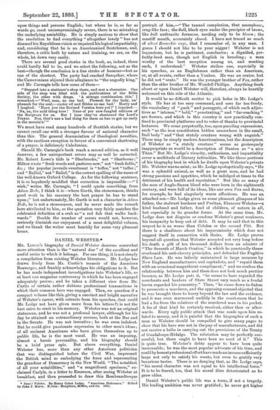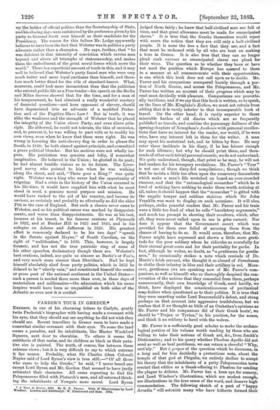DANIEL WEBSTER.*
Mn. LODGE'S biography of Daniel Webster deserves somewhat more attention than is the "natural due" of the excellent and useful series to which it belongs. For one thing, it is not simply a compilation from existing Webster literature. Mr. Lodge has drawn freely from Mr. Curtis's memoir of the American Boanerges, and frankly acknowledges his obligations to it. But be has made independent investigations into Webster's life, as at least one magazine controversy in which he has been engaged adequately proves ; and he takes a different view from Mr. Curtis of certain rather dubious professional transactions in which their common hero was engaged. Then, we question if a compact volume like this, giving a succinct and bright narrative of Webster's career, with extracts from his speeches, (but could Mr. Lodge not have given more from his letters?) is not the best cairn to erect to his memory. Webster was not an original statesman, and he was not a profound lawyer, although for his day be attained an extraordinary success, both at the Bar and in the Senate. He was not inventive ; he was even indolent. But he could give passionate expression to other men's ideas ; of all eminent Americans who have given themselves up to public life, be is the most vocal. He was an imposing, almost a heroic personality, and his biography should be a brief prose epic. Bat above everything, Daniel Webster has, more than any other American politician that was distinguished before the Civil War, impressed the British mind as embodying the force and representing the grandeur of Democracy in the New World. "The notablest of all your notabilities," and "a magnificent specimen," ex- claimed Carlyle, in a letter to Emerson, after seeing Webster at breakfast, and then proceeded to draw this Rembmndtesque • Dani,41 Webster. By Henry Cabot Lodge. "American Statesmen." Edited by doh', J. Stone, BI.ston: Houghton, Mifflin, and Co. 1883. portrait of him,—" The tanned complexion, that amorphour, crag-like face ; the dull, black-eyes under the precipice of brows, like dull anthracite furnaces, needing only to be blown; the mastiff mouth, accurately closed. I have not traced so much of silent Berserk* rage, that I remember of, in any man. I guess I should not like to be your nigger ! Webster is not loquacious, but he is pertinent, conclusive; a dignified, per- fectly-bred man, though not English in breeding ; a man worthy of the beat reception among ue, and meeting such, I understand." Webster strikes one, especially in his speeches, as an Englishman rather than an American, or, at all events, rather than a Yankee. He was an orator, but he did not "orate." He was the younger brother of Fox, rather than the elder brother of Mr. Wendell Phillips. Anything fresh about or upon Daniel Webster will, therefore, always be heartily welcomed on this side of the Atlantic.
It would be no difficult matter to pick holes in Mr. Lodge's style. He has at too easy command, and uses far too freely, the vocabulary of " gush " and panegyric, of which such adjec- tives as "intense," "bold," "penetrating," and " far-reaching " are flowers, and which in this country is now practically con- fined to provincial platforms and to votes of thanks to provincial lecturers. We come perpetually, too, upon puzzling expressions, such "as the iron constitution hidden somewhere in the small, frail body" and "that stately creature wrung with anguish." These may be simply modern Americanisms, but the description of Webster as "a stately creature" seems as grotesquely inappropriate as would be a description of Denton as "a nice Titan." But Mr. Lodge's vivacity, enthusiasm, and impartiality cover a multitude of literary infirmities. We like those portions of his biography best in which he dwells upon Webster's private life. Webster was no saint; as Mr. Lodge apologetically says, "He was a splendid animal, as well as a great man, and he had. strong passions and appetites, which he indulged at times to the detriment of his health and reputation." But like so many of the men of Anglo-Saxon blood who were born in the eighteenth century, and were full of its ideas, like our own Fox and Burns, for example, he had singularly warm affections. He was an attached son—Mr. Lodge gives us some pleasant glimpses of his father, the stalwart borderer and Puritan, Ebenezer Webster—a kind husband and father, fond of children, of nature in all, but especially in its grander forms. At the same time, Mr. Lodge does not disguise or condone Webster's great weakness, his incapacity to keep out of debt. It may be said that in this respect be is no worse than Cobden or the second Pitt. But there is a shadiness about his impecuniosity which does not suggest itself in connection with theirs. Mr. Lodge proves beyond all question that Webster accepted not very long before his death a gift of ten thousand dollars from an admirer of "The Seventh of March Oration," in which he practically threw overboard his anti-slavery principles, and defended the Fugitive Slave Law. He was latterly maintained in large measure by New England manufacturers and capitalists, and "repaid them with an occasional magnificent compliment ;" and we confess the relationship between him and them does not look much prettier because, as Mr. Lodge puts it, "he seems to have regarded the merchants and bankers of State Street very much as a feudal baron regarded his peasantry." Then, "he came down to Salem to prosecute a murderer, and the opposing counsel objected that he was brought there to hurry beyond the law and the evidence, and it was even murmured audibly in the court-room that he had a fee from the relatives of the murdered man in his pocket. A fee of that kind he certainly received, either then or after- wards. Every ugly public attack that was made upon him re- lated to money, and it is painful that the biographer of such a. man as Webster should be compelled. to give many pages to show that his hero was not in the pay of manufacturers, and did.
not receive a bribe in carrying out the provisions of the Treaty of Guadaloupe-Hidalgo. The refutation may be perfectly suc- cessful, but there ought to have been no need of it." This is quite true. Webster's debts appear to have been quite inexcusable; he was the most popular advocate of his time, and could by honest professional effort have mule an income sufficiently large not only to satisfy his wants, but even to gratify very luxurious tastes. There is no denying that, as Mr. Lodge says, "his moral character was not equal to his intellectual force." It is to be feared, too, that his moral fibre deteriorated as he grew older.
Daniel Webster's public life was a torso, if not a tragedy. His leading ambition was never gratified ; he never got higher
up the ladder of official politics than the Secretaryship of State, andhis closing days were embittered by the preference given by his party to General Scott over, himself as their candidate for the Presidency. The reason for this failure Mr. Lodge apparently believes to have been the fact that Webster was in politics a party advocate rather than a champion. He says, further, that "he was deficient in that intensity of conviction which carries men beyond and above all triumphs of statesmanship, and makes them the embodiment of the great moral forces which move the world." There is a superficial amount of truth in this, and it may well be believed that Webster's party found men who were very much better and more loyal partisans than himself, and there- fore much better fitted for the role of standard-bearer. What, moreover, could look more inconsistent than that the politician who entered public life as a Free-trader—his speech on the Berlin and Milan decrees showed that for the time, and for a man of his temperament, he had obtained a really wonderful mastery of financial questions—and keen opponent of slavery, should have degenerated into an advocate of a modified Protec- tion and of the Fugitive Slave Law But in' truth, it was alike the weakness and the strength of Webster that he placed the integrity of the Union above Party, and even above prin- ciple. He abhorred, he could not tolerate, the idea of secession, and, to prevent it, he was willing to part with or to modify his own views, even when he knew that these were right. He was wrong in lowering the anti-slavery flag in order to please the South, in 1848; he both sinned against principle, and committed a grave political blunder. But his motives were not wholly im- pure. His patriotism was genuine and lofty, if somewhat imaginative. He believed in the Union ; he gloried in its past; he had almost beatific visions as to its future. The Liver- pool navvy who pointed to him when he was walking along the street, and said, "There goes a King !" was quite right. Webster was a king who never had the opportunity of reigning. Had a crisis in the history of the Union occurred in his life-time, it would have supplied him with what he most stood in need, a genuine moral purpose and mission. He would have rushed to the aid of his country, and become its saviour, as certainly and probably as effectually as did the elder Pitt in the case of England. But such a chance never came to Webster, and so his political career was marked by disappoint- ments, and worse than disappointments. He was at his best, because at his truest, in his famous orations at Plymouth in 1822, and at Bunker Hill in 1825 and 1843, and in his eulogies on Adams and Jefferson in 1826. His greatest effort is commonly declared to be his two days' "speech in the Senate against Rayne," of South Carolina, on the right of "nullification," in 1830. This, however, is largely forensic, and has not the true patriotic ring of some of his other speeches, declamatory though these are. Webster's best orations, indeed, are quite as sincere as Burke's or Fox's, and very much more sincere than Sheridan's. Had he kept himself absolutely aloof from party politics, which in 1852 he dclared to be " utterly vain," and constituted himself the orator or prose poet of the national sentiment in the United States— such a person is needed there more than ever, in these days of materialism and millionaires—the admiration which his name inspires would have been as unqualified on both sides of the Atlantic as even now it is cordial.



































 Previous page
Previous page